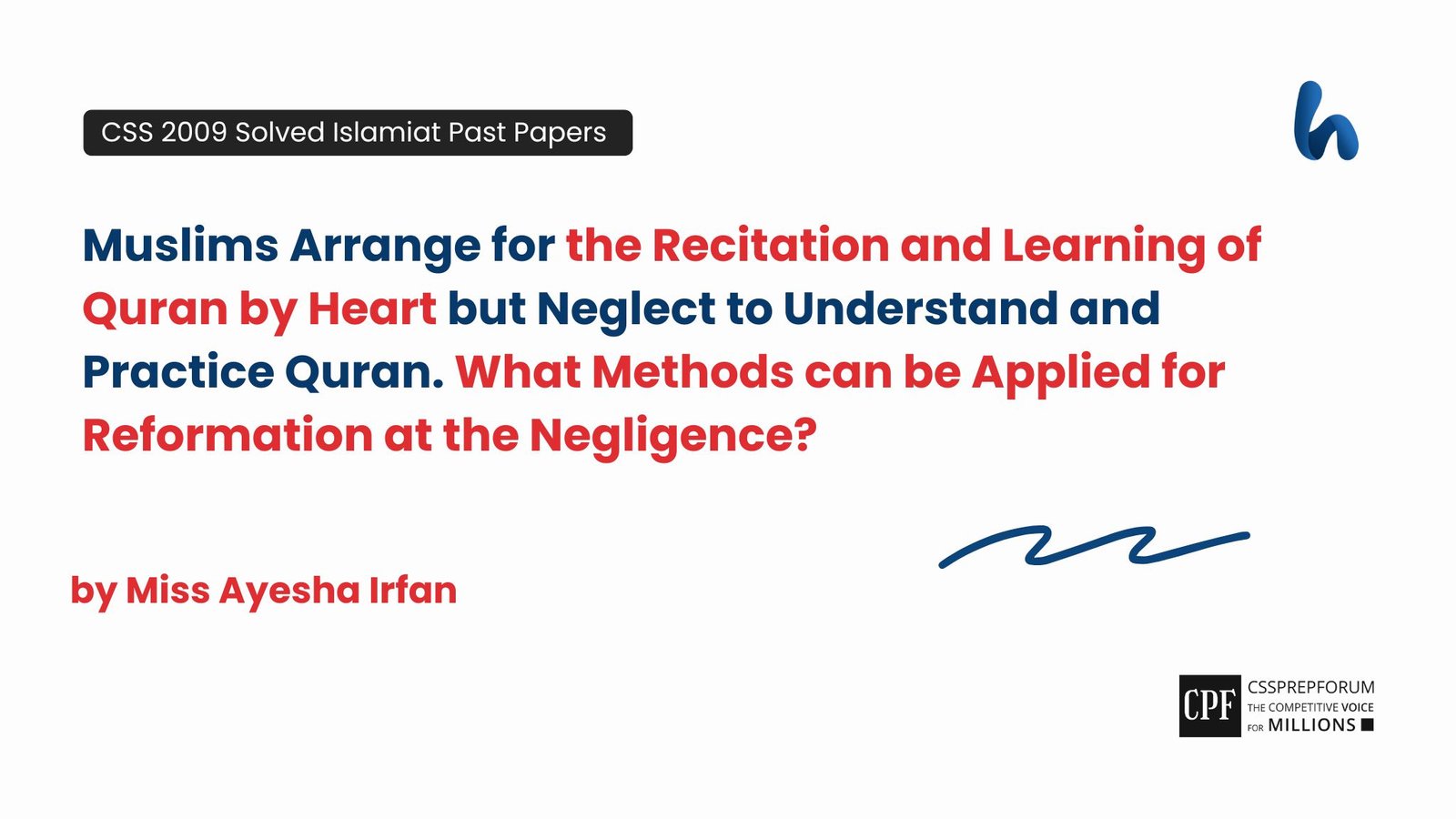CSS Solved Criminology Past Paper CSS 2023 | Scope of Criminology as Science Dealing

Question Breakdown
In this question, the examiner has inquired about the scope of criminology as a science that deals with the study of criminal law, forensics and investigation. The above query comprises of three main parts that require explanation, which include: criminology as a science, its scope and how it deals with the study of criminal law, forensics and criminal investigation. Aspirants should start their answer by defining criminology and explaining its scientific nature. Addition of scholarly references, definitions and examples will make the answer outstanding. Moreover, flow charts, diagrams, tables and relevant quotations can further ameliorate the quality of the answer.
Outline
1-Introduction
2-Defining Criminology
3-Scientific Nature of Criminology
- ✓Law of Three Stages by August Comte
- ✓Criminology as a Social Science
- ✓Views of Various Criminologists
4-Scope of Criminology as a Science
- ✓Study of Criminal Law
- ✓Study of Forensics
- ✓Study of Criminal Investigation
5-Critical Analysis
6-Conclusion

Answer to the Question
Introduction
Criminology is the youngest, most dynamic and fascinating field of studying crime and criminals. It is multidisciplinary in nature as it examines criminal behavior, social as well as legal responses through the application of scientific methods. Coleman and Norris are of the notion that criminology is an analysis of the nature of crime, causes of crime, formation of criminal law, enforcement of law and how crime can be controlled. It is developed through different schools like pre-classical, classical, positive, sociological, neoclassical, modern and Islamic school of thought. The scope of criminology includes the study of various forms, nature, causes, motives, positions, attributes and elements of crime, working and problems in the criminal justice system, the police and prison systems. It is a new emerging field which encompasses terrorism, forensic science, criminal investigation and strategic studies, as it gives a situation analysis of crime. According to Justice Krishna Iyer,
“Criminology is a special field of knowledge, systematic discipline, nidus of criminal law on the sociological plane, dealing with crime and deviance and those individuals who violate law, how they are arrested, how they are prosecuted, how they are convicted, how they are put in prison, how they are trialed.”
Defining Criminology
Criminology emerged as a subject in the nineteenth century. It is a Latin expression and the word is a combination of two words; ‘crimen’ which means ‘accusation’ and ‘ologia’ which means ‘theory or philosophy’. The term ‘criminologia’ was coined by Raffaele Graffalo in 1885 and ‘criminologie’ was coined by Paul Topinard in 1887. By criminology, they meant the science whose purpose is to discover the causes of crime and the study of criminality with its entirety. According to Elliott,
“Criminology is the scientific study of crime and its treatment.”
Sage dictionary defines criminology as,
“The study of crime, attempt to it, attitude to it.”
In addition, according to Sutherland,
“Criminology is the process of law making, law breaking and reacting towards law breaking.”
Furthermore, Donald Taft defines criminology as,
“A modern youngest discipline. Its contents are analyzing causes of crimes, explaining theories of crimes, motives and elements of crime and preventive strategies for combating new emerging crimes.”
Scientific Nature of Criminology
According to Horton and Hunt, science is an organized and verified method of knowledge which has been obtained through social investigation. Though it is evident that crime and criminality are understood via scientific methods, there are diverse notions and theoretical perspectives in criminology. These ideological differences are explained by Brown, Esbensen and Geis,
“There are many criminologies and criminologists… If we are to create a viable and vibrant criminology the time has come for us to accept the diversity of our subject and for criminologists of different epistemological and theoretical persuasions to talk seriously with one another, not at or past one another.”
Law of Three Stages by August Comte

Figure 1: Law of Three Stages
Criminology has passed through all these stages like other subjects and knowledge. Therefore, it is considered as a science.
Criminology as a Social Science
The characteristics of science are observation, experimentation, validation, practicality, universal proposition, and interrelated facts. Criminology is a social or behavioral science because it borrows and integrates knowledge from other sciences. The basic unit of criminology is ‘crime’ as in sociology is society. Crime is a living concept which is dynamic as well as ever-changing, thus, not stable, homogeneous and universal. This means that criminology is a social science, not a pure science, as it lacks similar results.
Views of Various Criminologists
Criminologists and scholars have diverse opinions regarding the scientific basis of the subject. Skepticism started in 1932 after a report by Jerome Michael and Mortimer Adler. The authors delineated that “the work of criminologists has not yet resulted in scientific knowledge of the phenomena of crime”. While a few scholars like Sutherland, Cressey, Max Weber and George Wilikes are of the notion that criminology is not a science, thinkers like Marwin Wolfgang, Franco, Allen Burger and Hermann Maheim call criminology a separate discipline and science with its own rules and research methodology.
Scope of Criminology as a Science
The scope of criminology has increased due to emerging crimes, cybercrimes, scandals, frauds, deceptions and white collar crimes. It includes penal policies, the parole and probation system, as well as the study of criminal law, forensics and criminal investigation. In Pakistan, the scope of criminology has increased due to the increased rate of crime and because of wealth, women and land, as these are the primary reasons for most crimes. According to Donald Taft,
“Criminology offers a background for professionals and opportunity for policy makers, academicians, researchers, judges, jurors, crime analysts, legalists in pursuit of understanding crime and criminal behavior and enhancing their professional skills. They need a perfect and sound knowledge of criminology.”
Study of Criminal La
The scope of criminology focuses on the origin of criminal law, the causes of crimes and explanations of crime. Moreover, it deals with law making in Pakistan (Article 71-75), law breaking (criminals and their types) and reacting towards law breaking (minimum and maximum punishments, criminal courts, anti-terrorism courts, custom courts, narcotics courts, FIA courts, session courts, NAB courts and juvenile courts etc.). George Bernard Shaw is of the notion that,
“If you are going to punish a man retributively, you must injure him. If you are to reform him, you must improve him and men are not improved by injuries.”
According to Sutherland, criminology is the scientific study of criminal behavior and the criminal justice system along with the creation, violation and enforcement of laws. Prevention of Electronic Crimes Act (PECA) 2016 is studied by criminologists of Pakistan in order to deal with cybercrime.
Study of Forensics
Criminology is the fastest growing subject across the globe, which holds great significance. The scope of criminology consists of comparative forensic criminology, international and cross-cultural criminology, penology, juvenile crime and the prison system. New orientation is envisioned in the field of study of criminology. Various steps are taken by governments across the globe, for example, Pakistan Journal of Criminology, Pakistan Society of Criminology and Punjab Forensic Lab 2009 are a few such initiatives. According to the Rational Choice Theory, there are fewer chances of criminal activities if forensic technology increases the risk of being caught. In Pakistan, Punjab Forensic Science Agency (PFSA) is established in order to collect and examine physical evidence, investigate cybercrimes and conduct DNA analysis, etc., to reach the culprit.
Study of Criminal Investigation
The scope of criminology also deals with the study of criminal investigation, which is an art as well as a science of finding or digging out the truth in criminal activities of suspects. According to Curzon,
“Criminal investigation is a legal process which aims at finding out the culprit and collecting evidence.”
Theories of criminology, such as Strain Theory by Robert K. Merton, help in understanding the root causes of criminal behavior, thus refining the investigation of crime. Techniques of criminal investigation like interrogation, interview and surveillance are also explained by criminological principles. In the contemporary era, criminal investigations rely on advanced technology and digital evidence as indicated by Interpol.
Critical Analysis
According to the historical practitioners like C. Beccaria and Feri and contemporary ones like Bartol and Cornwell, criminology is a science which includes the study of nature, extent, cause and control of crime. Criminology is considered as a social science which teaches about the treatment and rehabilitation of criminals. It is an interdisciplinary field encompassing the study of root causes of crime along with the theoretical explanations of criminal behavior such as Strain Theory by Robert K. Merton and Social Disorganization Theory, etc. The multidisciplinary approach in criminology allows it to acquire knowledge from other related sciences like sociology, anthropology and psychology, etc. It assists in bridging the gap between understanding causes of criminal behavior and effective implementation of measures to eradicate the issues. In the contemporary era, growing challenges like cybercrime and organized crime can only be addressed through investigative techniques delineated through criminology.
Conclusion
In a nutshell, criminology is the science of crime, criminals and their punishments. The discipline emerged in the twentieth century, however, it has refined and evolved due to scholars’ endeavours throughout these years. Its main focus is practical application; for this purpose, it has made contributions to the criminal justice system. The scope of criminology has increased with the increased crime rate, and it deals with the study of criminal law, forensic technology, as well as criminal investigation. Criminology encompasses everything from law making to violation of laws and collecting evidence for finding the culprit. In his work “Principles of Criminology”, Sutherland delineates,
“Criminology is a body of knowledge regarding crime as a social phenomenon. It includes in its scope the process of law making, law breaking and reacting towards law breaking.”

CSS Solved Past Papers’ Essays
Looking for the last ten years of CSS and PMS Solved Essays and want to know how Sir Kazim’s students write and score the highest marks in the essays’ papers? Then, click on the CSS Solved Essays to start reading them.
CSS Solved Essays
CSS Solved General Science & Ability Past Papers
Want to read the last ten years’ General Science & Ability Solved Past Papers to learn how to attempt them and to score high? Let’s click on the link below to read them all freely. All past papers have been solved by Miss Iqra Ali & Sir Ammar Hashmi, Pakistan’s top CSS GSA coach having the highest score of their students.












